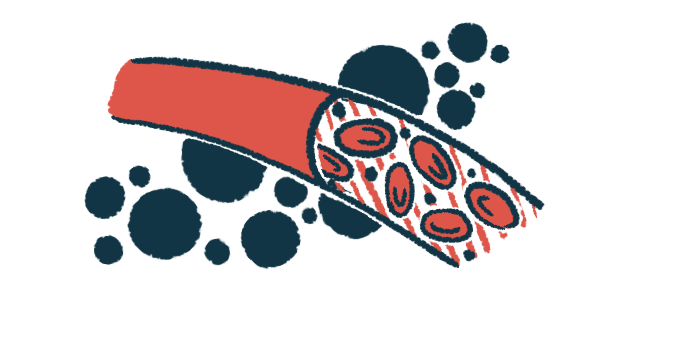New biomarker may predict who benefits from AS therapy: Study
High levels of protein, heightened immune response identified as key factors
Written by |

A heightened type 1 interferon (IFN) immune response and elevated levels of AIF-1 protein may help identify ankylosing spondylitis (AS) patients at risk of not improving from treatment with tumor necrosis factor inhibitors (TNFi), a study shows.
The study also defined a cutoff value of AIF-1 that could make it possible to identify such AS cases.
“These findings highlight the need for personalized treatment strategies based on baseline IFN signatures to improve clinical outcomes in AS,” researchers wrote.
The study, “Type 1 interferon signature and allograft inflammatory factor-1 contribute to refractoriness to TNF inhibition in ankylosing spondylitis,” was published in the journal Nature Communications.
30% to 40% of AS patients fail to respond to TNFi therapy
AS is a form of arthritis that causes inflammation and swelling in the spine and the joints that connect the bottom of the spine to the pelvis. Symptoms include fatigue, pain, and stiffness.
While TNFi therapy effectively manages active inflammation, between 30% to 40% of AS patients fail to respond.
Given the limited response rates, high costs, and potential side effects of prolonged TNFi use, it is important to identify patients most likely to benefit from this type of treatment.
Recent research has focused on the role of particular groups of immune cells, namely monocytes and T helper 17 (Th17) cells, in AS. Exposure to TNF-alpha promotes an inflammatory response, marked by the production of pro-inflammatory signaling molecules, or cytokines. Conversely, TNF inhibition is known to suppress these pathways.
“In this study, we aim to clarify immunological mechanisms behind TNFi non-response in AS and identify biomarkers for predicting therapeutic outcomes,” the scientists wrote.
AIF-1 identified as new biomarker of lack of response to TNFi treatment
A team from the Republic of Korea analyzed blood immune cells from AS patients treated with TNFi. They used single-cell RNA sequencing, a technique that allows the analysis of the transcriptome — in particular, messenger RNA molecules that serve as templates to make proteins — at the level of a unique, single cell.
Blood samples collected from 225 patients before and after TNFi treatment were included in the analysis. Findings from a discovery group were then validated in three additional groups.
Results revealed distinct immune responses following TNFi treatment. Responders exhibited a significant decrease in CD14-positive monocytes and an increase in B-cells, immune cells that produce antibodies. After treatment, non-responders showed higher proportions of natural killer cells, which form part of the innate immune system, and plasma cells, which develop from B-cells that have been activated.
Further analysis indicated that non-responders had more cytotoxic T-cells and proliferating cells, or those increasing in numbers, than responders. Among all immune cells, monocytes exhibited the most profound messenger RNA changes in both responders and non-responders, becoming the focus of the analysis.
Our study demonstrated that elevated [type 1 IFN] signatures marked by AIF-1 are associated with a non-response to TNFi treatment in patients with AS, leading to increased Th17 activity and clinical deterioration in NRs [non-responders].
Type 1 IFN is a key part of the innate immune response and controlling inflammation. Among type 1 IFN-related genes, AIF-1 was identified as a biomarker of the lack of response to TNFi treatment.
A multivariate analysis — based on the relationship between several variables — revealed that AS patients with blood AIF-1 levels of at least 63.5 picograms/ml had 6.96 times higher risk of being a non-responder. This cutoff was confirmed in one of the validation groups, with a sensitivity of 89.5% and specificity of 82.1%. Sensitivity refers to a test’s ability to correctly identify those with a disease, whereas specificity refers to the ability to correctly rule out those who do not have it.
AIF-1 was found to promote an inflammatory state by increasing the levels of IFN-alpha receptor, which binds type 1 IFN, and Th17 cells.
Overall, “our study demonstrated that elevated [type 1 IFN] signatures marked by AIF-1 are associated with a non-response to TNFi treatment in patients with AS, leading to increased Th17 activity and clinical deterioration in NRs [non-responders],” the study concluded.







